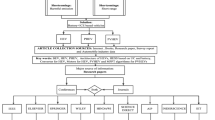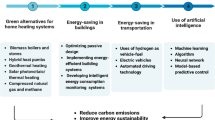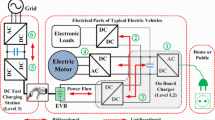Abstract
Improvements in hybrid electric vehicle (HEV) fuel economy and emissions heavily depend on an efficient energy management strategy (EMS). However, the uncertainty of future driving conditions generally cannot be easily tackled in EMS design. Most existing EMSs act upon fixed parameters and cannot adapt to varying driving conditions. Therefore, they usually fail to fully explore the potential of these advanced vehicles. In this paper, a novel EMS design procedure based on neural dynamic programming (NDP) is proposed. The NDP is a generic online learning algorithm, which combines stochastic dynamic programming (SDP) and the temporal difference (TD) method. Instead of computing the utility function and optimal control actions through Bellman equations, the NDP algorithm uses two neural networks to approximate them. The weights of these neural networks are updated online by the TD method. It avoids the high computational cost that SDP suffers from and is suitable for real-time implementation. The main advantages of NDP EMS is that it does not rely on prior information related to future driving conditions, and can self-tune with a wide variance in operating conditions. The NDP EMS has been applied to “Qianghua-I”, a prototype of a parallel HEV, using a revolving drum test bench for verification. Experiment results illustrate the potential of the proposed EMS in terms of fuel economy and in keeping state of charge (SOC) deviations at a low level. The proposed research ensures the optimality of NDP EMS, as well as real-time applicability.
Similar content being viewed by others
References
JOHNSON V H, WIPKE K B, RAUSEN D J. HEV control strategy for real-time optimization of fuel economy and emissions[G]. SAE Paper No. 2000-01-1543.
SCHOUTEN N J, SALMAN M A, KHEIR N A. Fuzzy logic control for parallel hybrid vehicles[J]. IEEE Transactions on Control Systems Technology, 2002, 10(3): 460–468.
WON J S, LANGARI R. Intelligent energy management agent for a parallel hybrid vehicle—Part II: torque distribution, charge sustenance strategies, and performance results[J]. IEEE Transactions on Vehicular Technology, 2005, 54(3): 935–953.
LIN C C, PENG H, GRIZZLE J W, et al. Power management strategy for a parallel hybrid electric truck[J]. IEEE Transactions on Control Systems Technology, 2003, 11(6): 839–849.
DELPRAT S, LAUBER J, GUERRA T M, et al. Control of a parallel hybrid powertrain: optimal control[J]. IEEE Transactions on Vehicular Technology, 2004, 53(3): 872–881.
ZHANG Rongjun, CHEN Yaobin. Control of hybrid dynamical systems for electric vehicles[C]//Proceedings of American Control Conference, Arlington, VA, USA, June 25–27, 2001: 2 884–2 889.
PICCOLO A, IPPOLITO L, GALDI V, et al. Optimization of energy flow management in hybrid electric vehicles via genetic algorithms[C]//IEEE/ASME International Conference on Advanced Intelligent Mechatronics, July 8–12, Como, Italy, 2001: 434–439.
LIN C C, PENG H, GRIZZLE J W. A stochastic control strategy for hybrid electric vehicles[C]//2004 American Control Conference, Boston, USA, 30 June–2 July, 2004: 4 710–4 715.
LIN C C, KIN M J, PENG H, et al. System-level model and stochastic optimal control for a PEM fuel cell hybrid vehicle[J]. Journal of Dynamic Systems, Measurement, and Control, 2006, 128(4): 878–890.
BERTSEKAS D P, HOMER M L, LOGAN D A, et al. Missile defense and interceptor allocation by neuro-dynamic programming[J]. IEEE Transactions on Systems, Man and Cybernetics, Part A: Systems and Humans, 2000, 30(1): 42–51.
PARK J W, HARLEY R G, VENAYAGAMOORTHY G K, Adaptive-critic-based optimal neurocontrol for synchronous generators in a power system using MLP/RBF neural networks[J]. IEEE Transactions on Industry Applications, 2003, 39(3): 1 529–1 540.
CHAKRABORTY S, SIMOES M G. Neural dynamic programming based online controller with a novel trim approach[J]. IEE Proc.-Control Theory Appl., 2005, 152(1): 95–104.
Author information
Authors and Affiliations
Corresponding author
Additional information
This project is supported by Innovation Technology Fund of the Hong Kong Special Administrative Region of China (Grant No. GHP/011/05)
LI Weimin was born in 1976. He received his BS and MS degrees from Shandong University of Science and Technology, China, in 1998 and 2003, respectively. Now he is a PhD candidate at Department of Automation, Shanghai Jiao Tong University, China. And his research interests focus on hybrid electric vehicle, motor control and neural network design.
XU Guoqing received his PhD degree from Zhejiang University, China, in 1994. From 1997, he worked in Tongji University, China as associate professor, professor, and chairman of Department of Electrical Engineering. He is now a research professor at The Chinese University of Hong Kong, China, director of Shenzhen Institute of Advanced Integration Technology, director of Center for Automotive Electronics. His research interests have been in the areas of electric traction vehicle and automation, novel energy converter and control, and vehicle safety electronics.
XU Yangsheng (SM’95-F’03) received his PhD degree in robotics from the University of Pennsylvania, Philadelphia, USA, in 1989. He has been with The Chinese University of Hong Kong, China, since 1997 where he was chairman of Department of Automation and Computer-Aided Engineering from 1997 to 2004, and where currently he is chair professor. He was a faculty member with the Robotics Institute, Carnegie Mellon University, Pittsburgh, PA, from 1989 to 1999 (on leave 1997 to 1999). His research has been in the areas of robotics, automation, and interface. Dr. XU is a fellow of IEEE, fellow of HKIE, academician of Chinese Academy of Engineering, academician of Eurasian Academy of Sciences, and corresponding member of International Academy of Astronautics.
Rights and permissions
About this article
Cite this article
Li, W., Xu, G. & Xu, Y. Online learning control for hybrid electric vehicle. Chin. J. Mech. Eng. 25, 98–106 (2012). https://doi.org/10.3901/CJME.2012.01.098
Received:
Revised:
Accepted:
Published:
Issue Date:
DOI: https://doi.org/10.3901/CJME.2012.01.098




